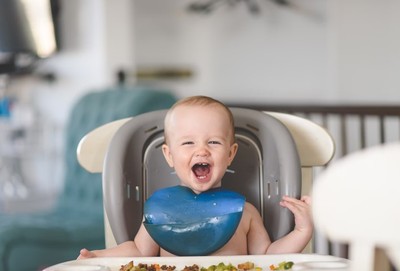Parenting 101: The importance of iron for your baby’s growth

We need iron for healthy growth and development. To be precise, our bodies use this essential mineral to make hemoglobin, a protein found in red blood cells that carries oxygen from our lungs to the rest of the body. Babies and small children in particular need sufficient iron supplies for their brains to develop normally.
In this article, we look at the importance of iron for your baby's growth.
Introducing Iron-Rich Foods
Babies are born with iron stores, and breastfeeding ones can absorb it from breast milk for the first six months. However, once babies reach six months, a time of rapid growth and the start of solids, their first foods should also be iron-fortified. Take a look at this selection of baby and toddler food ideas rich with iron:
#1 Iron-fortified cereal
Offering fortified and, importantly, low-sugar cereals like oatmeal are among the best and currently most popular ways to assure your toddler gets enough iron. The iron in baby cereal ensures enough quantity of this mineral in their bodies, as it typically has 100% of the daily value for iron in just one serving. Hence, give your child a breakfast porridge or cereal most days of the week. However, keep in mind that the iron contained in cereals is nonheme. So, to increase its absorption in your baby's organism, blend the grain with foods (like peas, leafy greens, and berries) or juice high in vitamin C, which helps the iron absorption.
#2 Red Meat and Poultry
Parents commonly introduce single-grain cereals as a first solid food, followed by vegetables, fruit, and lastly, meats. However, red meat and poultry are the best sources of iron because they contain heme iron; you can also introduce them as pureed food first. Importantly, meat and poultry have other essential nutrients vital for your child's development because they are also high in protein and zinc. Hence, giving your child beef, lamb, pork, and poultry three times a week is recommended.
#3 Beans
If you are a parent that aims for a vegetarian diet or your child is not a meat fan, beans are a great option. From soybeans, lima beans to kidney beans, lentils, and other beans - these legumes contain not just iron but also fiber and other essential vitamins and minerals, perfect for your child's growth. You can prepare and serve them as a puree or a soup. To get a complete protein and high-iron meal, you can add mashed enriched rice.

#4 Fish
Fish is an important food to introduce into your toddler's diet as it is highly nutritious. Canned light tuna is a great supplier of iron and other vital nutrients like protein and omega-3 fatty acids. Importantly, it contains 1 mg of iron per serving. The best way to serve it is shredded with pureed vegetables. Keep in mind that fish, in general, is an excellent source of protein, and some fish, such as salmon, are high in much-needed omega-3 fatty acids.
#5 Eggs and Spinach
Eggs are a valuable source of necessary protein, vitamins, and minerals, including iron. One boiled egg contains 1 mg of iron. You can serve them to your toddler in many variants - from soft or hard-boiled, to scrambled or as an omelet with chopped spinach, which is also an iron-rich food. Importantly, always make sure the egg is fresh and well cooked.
When Babies Don't Get Enough Iron
Suppose your child does not get enough iron in their diet. In that case, it can impair their ability to function well, and they are at risk of developing anemia. Iron deficiency anemia is a lack of iron in the blood, most commonly affecting babies 9 through 24 months old. If a child has anemia, they might have a poor appetite and seem tired and pale. As a result, they will be less able to fight infection and might be sick a lot. Other most common symptoms of iron deficiency anemia are irritability or fussiness, lack of energy, fast heartbeat, sore or swollen tongue, enlarged spleen, and carvings for odd substances, such as dirt or ice. Ultimately, when a baby is deficient in iron, they may experience cognitive and behavioral development deficits and delays.
Conclusion
Iron is an essential dietary mineral involved in various bodily functions. Because babies and toddlers grow rapidly in the first months and years of their lives, they need to ingest a lot of iron each day. For this reason, parents must ensure that their children consume healthy and iron-rich food found both in animal and plant products. If that does not happen, the iron stores in their bodies can become too low, leading to iron deficiency anemia.


